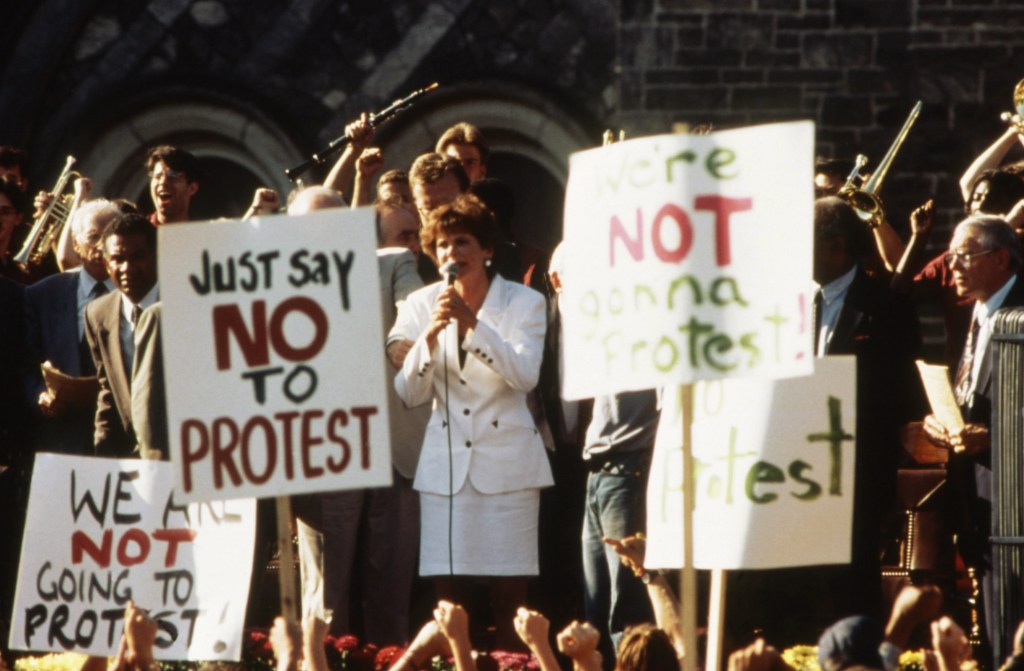There was no better time than the 1990s to be young, female, and angry. Riot Grrrl’s feminist thrash finally offered women an alternative-music scene of their own, while Alanis Morissette’s more palatable brand of ferocity topped the charts. Authority-confronting comics like Margaret Cho and Janeane Garofalo used their guile to defy feminine expectation, and dark-spirited ingénues such as Winona Ryder, Christina Ricci, and Angelina Jolie lent their doe-eyed morbidity to the big screen. And television? Well, television had Darlene Conner.
If you were a sardonic proto-goth coming of age two decades ago, there was no teenager on TV more iconic than Darlene Conner, played by razor-sharp Sara Gilbert. The second loudest mouthpiece on ABC’s Roseanne (inferior only to the explosive protagonist herself), the Conners’s middle child personified Gen X cool. With a feral mane of black spirals and jeans expertly shredded at the knees, her perpetual plaid flannel button-down shrouded her in the don’t-give-a-fuck spirit of grunge. Still, it was Darlene’s puckish, wittier-than-thou smirk that epitomized her cunning. There was no one—and especially not a loved one—this bitterly derisive teen couldn’t cut down a peg with her hatchet-like quips. (As she cracks in season six, “I don’t smoke pot. It dulls my hatred.”) What power-starved young kid didn’t want to be her?
Videos by VICE
Darlene, however, was more than just an irascible heroine of adolescent disaffection: She was also the Conner to root for. An ambitious and intelligent truth teller, she dreamed of a career as a comic-book author and becoming the first in her family to attend college. And when her rising star faced the possibility of falling at the end of the eighth season due to an unplanned pregnancy with her on-again/off-again boyfriend, even little girls like myself understood the gravity of her reproductive choice. The pain stared us in the face: Both her mom and older sister set aside their goals to elope with their high school sweethearts. Darlene, who swore she’d never repeat their mistakes, ends up marrying and becoming a mom at the age of 19.
To this day, Roseanne remains one of the few sitcoms to embrace the realities of American blue-collar life and, over the course of the series, Darlene becomes the symbol of upward mobility for a struggling family. Although she originates as an 11-year-old smart-ass tomboy, she soon morphs into a depressive alt-nerd whose seeming laziness is actually a sign of under-stimulated intellect. (In the pilot, her teacher accuses her of barking in class—classic acting out behavior for a gifted student. Later, in season two, we learn she is a vulnerable and precocious writer, exhibiting the first hints of her all-too-relatable melancholy.)
Throughout the series, her progressive, contrarian nature bubbles to the surface, chemically reacting to her Midwestern factory town. Her goth tendencies, veganism, and misandry all mark her as an iconoclast in a stifling small-town culture where football kings and cheerleading queens reign supreme. In season six, she finally transfers from their stagnant suburb to an art school in Chicago, the first of many hopeful steps toward intellectual and financial freedom.
Her family isn’t always supportive. In season eight, the Conners balk when she declines a well-paying job offer with an ad agency because it would entail quitting school. Roseanne confesses to Darlene that she toiled her whole life to give her kids a better chance than she had, but it has come with the price of her personal jealousy and Darlene’s increasing classism, as the girl can’t stop sniping about the worn state of the house or her parents’ lowbrow tastes. “It’s like you’re one of ‘them,’ and you’re putting ‘us’ down,” Roseanne admits, ashamed. The conversation is heartbreaking to watch, as an omniscient viewer knows how this will end just a season later: with Darlene electing to move back home with her mother to raise her newborn daughter, giving up her dreams of city life.
Darlene’s arc is a tragedy of thwarted female ambition undone by cyclical poverty, and her legacy can be seen today on such popular shows as Orange Is the New Black and Jane the Virgin, which take an explicitly feminist lens to how pregnancy and the expectations of womanhood can impede one’s upward trajectory. Roseanne ended exactly 20 years ago this spring, but its lessons are more relevant today than ever, as we navigate our way through a political environment where reproductive rights are being challenged all over the country and our president has vowed to overturn Roe v. Wade. Although Darlene decides to keep her pregnancy, she is a seminal example of the dangers of revoking our ability to choose, and her story remains a stark reminder of the realities of living in a culture that pressures women into prioritizing family over career.
Darlene’s dark, bellicose, and androgynous attitude was unlike any teenage girl seen on TV at that time, when vacuous or bubbly teeny boppers such as Full House‘s D.J. Tanner or Family Ties‘s Mallory Keaton were the norm. Now, Darlene’s heirs are all over peak TV: from One Day at a Time‘s radical, queer, teenage feminist Elena and Transparent‘ s non-binary floater Ali Pfefferman to Jessica Jones‘s leather-fitted, swaggering superhero or Girls‘ adventurous, determined writer Hannah Horvath. Even characters such as Parks and Recreation‘s sardonic goth April and Orange Is the New Black‘s wild-haired, wisecracking Nicky owe their identities to the original rule breaker. With a mouth like a whip and an idiosyncratic style that invited the rest of us weirdos to look up to her, Darlene rewrote the narrative for young women on television.
Follow Robyn Bahr on Twitter.




